Have you ever noticed how hot water seems to wash things more easily than cold water? 🤔 Whether it’s washing a greasy pan or cleaning a dirty sidewalk, using hot water often makes the job easier. In this article, we’ll explore the science of why hot water cleans better than cold water. We’ll use simple examples (like washing dishes or laundry) and see how it all connects to big cleaning jobs like hot water pressure washing. By the end, you’ll understand why the experts at AZ Power Wash Pros use hot water to get homes and businesses in Arizona sparkling clean!
TL;DR: The Quick Science of Hot Water Cleaning
🔥 Hot water melts grease and grime like butter in a hot pan.
🧪 It supercharges soap and detergents for faster, deeper cleaning.
💧 It spreads better due to lower surface tension, reaching more nooks.
🔫 It dissolves dirt faster, like hot tea dissolves sugar.
🦠 It kills germs that cold water can only rinse away.
⏱️ It cleans faster and more thoroughly, saving time and water.
🌵 Perfect for Arizona’s baked-on stains, monsoon mud, and greasy buildup.
✅ More effective, less chemical use, and better long-term results.
Introduction: The Power of Hot Water in Cleaning
Imagine you have a plate covered in sticky, greasy pizza cheese. If you try to rinse it with cold water, the grease just stays put and feels slimy. But if you use hot water, the grease melts away much faster. Why does that happen? It’s because hot water has special properties that make it a better cleaner. In fact, hot water can dissolve dirt and grease more effectively than cold water. That’s a big reason why hot water pressure washing is so effective for tough outdoor cleaning jobs – and it’s exactly what AZ Power Wash Pros specializes in here in Arizona.
What makes hot water so powerful for cleaning? There are a few simple science reasons:
- Heat breaks down grease and grime. Think of butter or chocolate: when they get warm, they melt. Hot water does the same to oily dirt – it melts and loosens it, making it easier to wash away.
- Hot water helps water do its job better. Water has something called surface tension (like a “skin” on the water) that makes it form droplets. When water is heated, it becomes a bit “looser” and can spread into cracks and tiny holes more easily. That means hot water can reach dirt that cold water might miss.
- Hot water dissolves things faster. If you stir sugar into iced tea, it takes a long time to dissolve. But in hot tea, sugar disappears quickly. In the same way, hot water helps soaps and cleaners dissolve stains and dirt faster.
- Heat can kill germs. When something is really hot, it can reduce or even kill bacteria and other germs. For example, water at 160°F (very hot!) can help sanitize dishes by killing many germs. This is why hospitals and restaurants use hot water for cleaning things – it not only cleans but also makes them safer by reducing germs.
The Science of Hot vs. Cold Water Cleaning
Before we look at big pressure washers, let’s understand what hot water is actually doing on a small scale. It’s all about science – but don’t worry, it’s simple and pretty cool!
Molecules on the Move: Everything is made of tiny particles called molecules. In water, these molecules move around. Hot water means the molecules are moving faster, and cold water means they’re moving slower. When water molecules move faster, they can bump into dirt and grease more often and help knock them loose. It’s like a crowd of fast-moving people jostling dirt off a surface! Hot water’s fast molecules help break the bonds holding grime onto surfaces.
Melting the Grime: Many kinds of dirt, especially greasy or oily dirt, are kind of like wax or butter – they get solid and hard when cool, but warm them up and they soften or melt. Hot water provides that heat. For example, the greasy fat from food can stick to a plate. In cold water, that fat stays solid (imagine bacon grease turning white and hard in a cold pan). But hot water melts the grease, turning it liquid so it can float away in the water. This melting effect is a huge reason hot water cleans better. It’s literally turning solid gunk into liquid so it can be washed off.
Lower Surface Tension: Here’s a term you might not know – surface tension. This is like an invisible skin on water that makes it form droplets (ever seen water form a bead on a leaf?). Cold water has higher surface tension, meaning it’s more likely to bead up and not spread out. Hot water has lower surface tension. That means it’s better at spreading and soaking into things. For cleaning, you want water to spread out and get into all the nooks and crannies of a dirty surface. Hot water is literally “wetter” – it can penetrate soil and grime more easily. A neat experiment shows this: drop a bit of food coloring into two glasses – one cold water, one hot water. In the hot water, the color spreads out much faster (because of both faster molecules and lower surface tension). The same goes for cleaning: hot water soaks and disperses dirt faster than cold.
Dissolving Power: Hot water can dissolve many substances more quickly. Think of making hot cocoa: the powder mixes in quickly with hot milk or water, but would mix poorly in cold. When you clean, you often use soap or detergent. Hot water helps dissolve soap and also helps the soap dissolve the dirt on surfaces. In fact, many cleaning products are designed to work best in warm or hot water. Detergents for washing dishes or clothes often say they work in cold, but work better in hot because the chemicals react faster. Hot water and soap make a great team – hot water helps soap form lots of tiny bubbles that grab onto grease and wash it away.
Killing Germs: While cold water can wash away germs, it won’t kill them. Hot water, on the other hand, can actually kill some germs if it’s hot enough. For example, the FDA recommends at least 160°F water for sanitizing dishes because that heat can kill bacteria. That temperature is too hot to touch, which is why dishwashers heat water so high. In everyday cleaning, using hot water means you’re not only removing visible dirt, but also helping reduce invisible germs like bacteria and viruses on surfaces. Hospitals use very hot water (often steam, which is even hotter) to sterilize equipment for this reason. Even in pressure washing, using hot water can help sanitize outdoor surfaces – for instance, hot water can significantly reduce bacteria on a surface, whereas cold water had no effect in one study. This is especially useful if you’re cleaning something like a restaurant floor or a trash area where germs might be lurking.
So scientifically speaking, hot water packs a one-two punch: it loosens dirt and grease (making it easier to remove) and it can reduce germs. Cold water just doesn’t have the same magic. Next, let’s see how these scientific benefits show up in everyday cleaning tasks you’re already familiar with.
Cleaning in Hospitals and Kitchens: Heat for Hygiene
Scenario: In places like hospitals, labs, or commercial kitchens, cleaning isn’t just about things looking nice – it’s about hygiene (killing germs so people don’t get sick). Have you heard of terms like “sterilization” or seen someone boil baby bottles? That’s using heat to disinfect. Here’s how hot water plays a role:
- Boiling to Sterilize: One of the oldest ways to sanitize objects (like baby bottles, canning jars, or medical tools) is to boil them in water. Boiling water is 212°F (100°C) – at that heat, nearly all bacteria and viruses are killed after enough time. Hospitals use machines called autoclaves which are like pressure cookers that use steam (super hot water vapor) to completely sterilize surgical instruments. This shows how higher temperatures can achieve a level of clean (germ-free) that cooler water alone cannot.
- Commercial Kitchens: Restaurants often have three-compartment sinks: wash, rinse, and sanitize. The sanitizing sink either uses a chemical sanitizer or very hot water. Health codes in many places say the hot water sanitizing rinse should be around 170°F. That high heat kills leftover bacteria on dishes, utensils, and countertops. Also, if you have ever seen a steam cleaner, restaurants sometimes use steam or hot water pressure washers to blast kitchen floors and equipment to remove grease and sanitize them.
- Mold and Algae Removal: Let’s consider cleaning something like a hospital floor or even an outdoor surface with algae or mold. Cold water might wash away visible dirt, but the spores (tiny seeds of mold/bacteria) can remain and grow back. Hot water cleaning has an advantage: it can kill those spores and growths. For instance, when AZ Power Wash Pros cleans a shady driveway with lichen or mildew, using hot water helps kill the mildew spores so the problem doesn’t return quickly. One professional noted that hot water breaks down organic growth and kills spores in a way cold water can’t. So surfaces stay cleaner longer.
How It Relates to Pressure Washing
Cleaning a driveway, patio, or storefront is like washing a giant greasy dish. Cold water might rinse off dust, but for oil stains, algae, gum, and baked-on dirt, only hot water can:
- Melt and lift the grime
- Reduce bacteria
- Remove stains faster and more completely
- Use less pressure and less water overall
Also, when sanitizing surfaces (say, an outdoor seating area or playground equipment), hot water pressure washers can reduce bacteria counts dramatically – for example, at 140°F, hot water reduces bacteria by 90% on a surface. It’s similar to how hot laundry water sanitizes clothes. So, the laundry example shows that while cold water can do a basic clean, hot water provides a deeper, faster clean when it counts – a principle AZ Power Wash Pros applies when deciding to use hot water for tough jobs.
Hot water pressure washing is not just about dirt, it’s about disinfection too.
For example, during times when there are concerns about viruses (like the COVID-19 pandemic), hot water pressure washers were used to sanitize playgrounds, benches, and bus stops. Heat is a key factor in reducing virus spread on surfaces. While pressure washing alone (with cold water) mostly just cleans surface dirt, pressure washing with hot water can both clean and partially disinfect surfaces by killing many germs. It’s like the difference between just wiping a counter vs. wiping it with a hot sanitizing solution.
AZ Power Wash Pros often emphasize that using hot water in our power washers means a more complete clean – for example, when we clean a restaurant’s dumpster area, the hot water not only removes smelly grease but also kills bacteria that cause odors. In an Arizona hospital exterior, hot water washing can remove bird droppings (which contain lots of germs) and help sanitize the area, making it safer for everyone.
Hot Water in the Pressure Washing Industry
Now that we’ve seen why hot water is so effective on everyday messes, it’s easier to understand hot water pressure washing (also called power washing). Pressure washing uses a machine to spray water at high pressure to clean surfaces. When that water is heated, we call it power washing (hot water pressure washing). Let’s break down why adding heat makes such a difference and how AZ Power Wash Pros uses this to deliver superior results.
Power Washing vs. Pressure Washing: What’s the Difference?
People often use these terms interchangeably, but there is a small difference:
- Pressure Washing usually means using cold or normal-temperature water under high pressure.
- Power Washing usually means using hot water (heated) under high pressure.
Think of it this way: both use the power of water pressure, but power washing adds the cleaning boost of heat. As we learned, that heat can be crucial for certain jobs. The heat makes power washing more effective at removing stubborn dirt, grease, and grime. On the other hand, pressure washing with cold water relies purely on the force of water and maybe chemicals, which might not fully clean oily or sticky messes.
At AZ Power Wash Pros, we offer mobile hot water power washing, meaning our equipment can heat the water on the fly. We often explain to customers that “almost everything comes cleaner with hot water”.
Tough Jobs that Are Easier with Hot Water
- Oil Stains on Concrete like Driveways
- Greasy Garage or Restaurant Floor
- Gum and Sticky Residues
- Mold, Mildew, and Algae Build up on Patios
- Neglected, Smelly or Germy Dumpster Pads
Arizona Needs Hot Water More Than Most States
- Sun-baked dirt & stains need heat to release from surfaces.
- Desert dust and monsoon mud crust onto homes and walkways.
- Oil and grease bake into concrete in the Arizona sun.
- Hot water softens and lifts these messes without harsh scrubbing or chemicals.
The AZ Power Wash Pros Difference
AZ Power Wash Pros prides itself on being “Arizona’s Mobile Hot Water Power Washing Provider”. This means we have specialized equipment on our trucks that can heat water up to the optimal temperature for cleaning (often between 160°F and 200°F). Our team is trained to adjust the pressure and temperature to match the job, giving a thorough clean without damage. Not every pressure washing company offers hot water – those that don’t might struggle with the tough stuff or resort to strong chemicals. We bring the full toolkit: hot water, proper pressure, and safe cleaning agents.
Key Take Aways: Hot Water Cleans Better – and We’ve Got You Covered!
We’ve learned a lot on this journey:
- Hot water cleans better than cold water.
- In pressure washing, using hot water (power washing) is often the secret to tackling the dirtiest, grimiest, germiest challenges. It’s the professional edge that yields a deeper clean.
- Here in Arizona, with our special mix of dust, heat, and occasional messes, hot water pressure washing is especially valuable. It removes sun-baked stains, cleans up after dusty winds, and does it efficiently while conserving water.
So next time you wonder why that stain won’t come out, or why your driveway still looks dingy after a hose-down, remember the hot water trick!
Is your property in need of some serious cleaning love? Let AZ Power Wash Pros show you the power of hot water pressure washing in action. We are the local experts in Phoenix and across Arizona who know how to use heat, pressure, and expertise to solve your cleaning problems. Whether it’s a simple patio wash or a heavy-duty commercial oil spill cleanup, we’ll apply the right technique to leave your surfaces spotless and sanitized.
📞 Phone: 602-475-8777 (Give us a call anytime for information or to schedule a service)


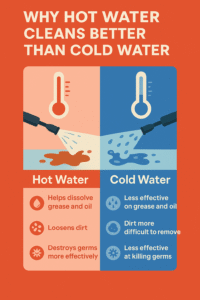
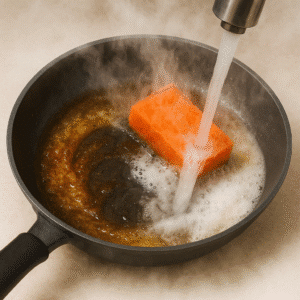
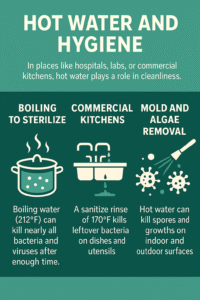
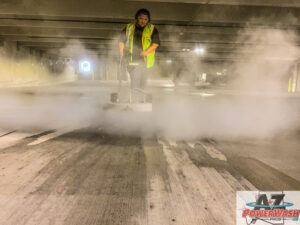
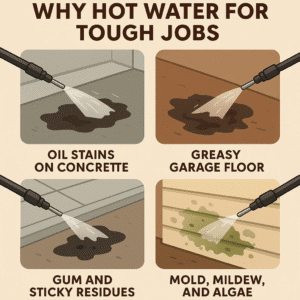





Comments are closed